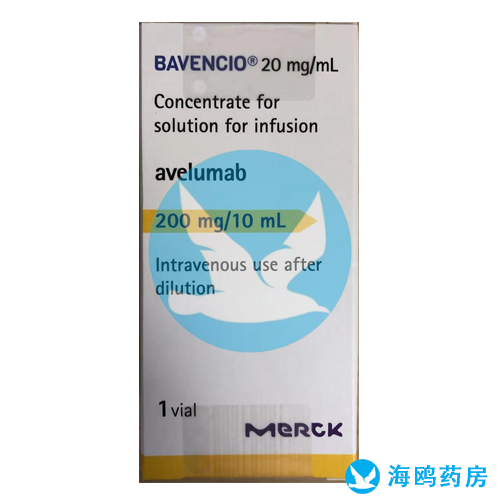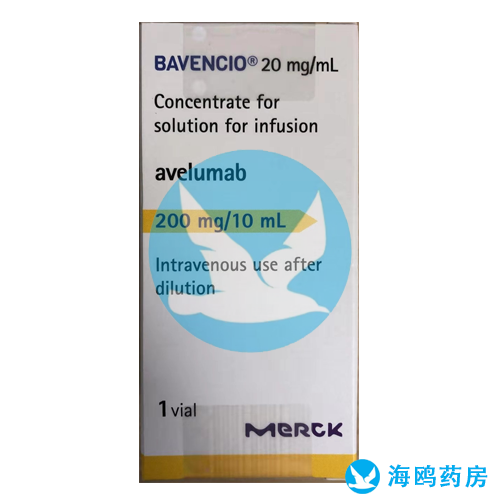- All Drug Categories
- Home
- Anti-cancer Drugs
- Healthcare Products
- Medical Information
- Statement
Results of the phase 2 NeoAvAx trial (NCT03341845) presented during the 2022 Genitourinary Cancers Symposium indicated that the neoadjuvant combination of avelumab (Bavencio) plus axitinib (Inlyta) has potential for use in patients with high-risk, non-metastatic clear-cell renal cell carcinoma (RCC).1

In the open-label, single-arm study, the neoadjuvant PD-1/tyrosine kinase inhibitor regimen induced a partial response in 12 (30%) of 40 patients. Median primary tumor downsizing was 20% (range, +3.8% to 43.5%). Among patients with a partial response, 10 of 12 were disease-free at the study data cutoff. At a median follow-up of 23.5 months, the median overall survival (OS) and median disease-free survival (DFS) had not yet been reached. No patients had progression of their primary tumor.
“This is the first neoadjuvant trial reporting results from a combination of an immune checkpoint inhibitor (ICI) and VEGFR-TKI for locally advanced high-risk RCC,” said lead study author Axel Bex, MD, PhD, of the Netherlands Cancer Institute.“The DFS data are encouraging, supporting further evaluation, although currently there are no randomized neoadjuvant versus adjuvant ICI trials or neoadjuvant versus adjuvant ICI/VEGFR-TKI combination [trials in this setting].”
Explaining the background of the NeoAvAx trial, Bex said, “Antibodies targeting PD-1/PD-L1 combined with VEGF inhibitors are a first-line standard of care for metastatic RCC. Neoadjuvant use of these combinations may lead to downstaging and reduce the risk of recurrence.”
Overall, there were 40 patients enrolled in the trial between May 2018 and October 2021.
The median patient age was 63 years (range, 47-74), 30% of patients were female, and 70% of patients were male. The World Health Organization performance status was 0 for 30 patients and 1 for 10 patients.
Baseline cTNMwere as follows: T1b-T2b (n = 4), T3a (n = 24), T3b (n = 4), T4 (n = 8). “Ninety percent of the patients had at least a T3 stage disease and higher,” noted
Bex. Biopsy grades were G1-2 (n = 27), G3-4 (n = 11), and Gx (n = 2).
Across the population, 42.5% (n = 17) of patients were clinically node positive. “Baseline lymph node diameter was a mean of 2.6 cm and the mean diameter of the primary tumor was 10.3 cm, so by no means was this a low-risk or intermediate-risk population,” explained Bex.
Study dosing was axitinib at 5 mg twice daily and avelumab at 10mg/kg every 2 weeks. The primary end point was partial response at week 12. Secondary endpoints included DFS, OS, and safety, and biomarker analysis on sequential tissue was an exploratory end point.
Overall, 13 (32.5%) patients had disease recurrence and 3 patients died of disease.
Bex said there were no new safety signals with the neoadjuvant regimen as compared with previously reported safety data for axitinib and avelumab. The majority of adverse events (AEs) were grade 1/2. There were 6 total grade 3 AEs, comprising 1 case each of hypertension, infusion-related reaction, fatigue, nausea, hand-foot syndrome, and elevated liver function tests.
Addressing the safety profile of the subsequent surgery patients received after the neoadjuvant regimen, Bex said, “Surgical adverse events were as expected in this patient population with locally advanced RCC.”
Bex also summarized the investigator findings from the exploratory biomarker analysis: “With regards to biomarkers, patients with recurrence had lower CD8+ densities after treatment compared to patients without recurrence. Spatial transcriptomics of post-treatment primary tumor tissue revealed focal intratumoral differences in immune signatures and we are currently investigating this further to see whether this may be one of the reasons why these patients have recurrence.”
The combination of avelumab and axitinib is currently approved by the FDA for the frontline treatment of patients with advanced RCC. The approval was based on results from the pivotal phase III JAVELIN Renal 101 trial, which showed that the combination was associated with a 31% reduction in the risk of disease progression or death compared with sunitinib (Sutent) in patients with treatment-naïve advanced RCC.2
References
Bex A, Abu-Ghanem Y, van Thienen JV, et al. Efficacy, safety, and biomarker analysis of neoadjuvant avelumab/axitinib in patients (pts) with localized renal cell carcinoma (RCC) who are at high risk of relapse after nephrectomy (NeoAvAx). J Clin Oncol. 2022;(suppl 6):289. 10.1200/JCO.2022.40.6_suppl.289
FDA Approves Bavencio (Avelumab) Plus Inlyta (Axitinib) Combination for Patients With Advanced Renal Cell Carcinoma. Pfizer Oncology. Published May 14, 2019. Accessed February 20, 2022. https://on.pfizer.com/2HtdCzF
https://www.cancernetwork.com/view/high-risk-early-rcc-may-benefit-from-neoadjuvant-avelumab-plus-axitinib
Disclaimer:《High-Risk Early RCC May Benefit from Neoadjuvant Avelumab Plus Axitinib》Edited and sorted by Seagull Pharmacy's editors. Please contact us in time if there is any infringement. In addition, the suggestions for drug usage, dosage and disease mentioned in the article are only for medical staff's reference, and can not be used as any basis for medication!

Full Name:avelumab,BAVENCIO
Reference Price:$2205.00
Prescribing Information: 阿维单抗(avelumab)说明书 通用名:阿维单抗 商品名:巴文西亚 全部名称:阿维单抗,阿维鲁单抗,巴文西亚,avelumab,BAVENCIO 适应症: 用于治疗转移性默克尔细胞癌(MCC)成年人和≥12岁儿童,包括那些尚未进行过化疗的患者。 ...